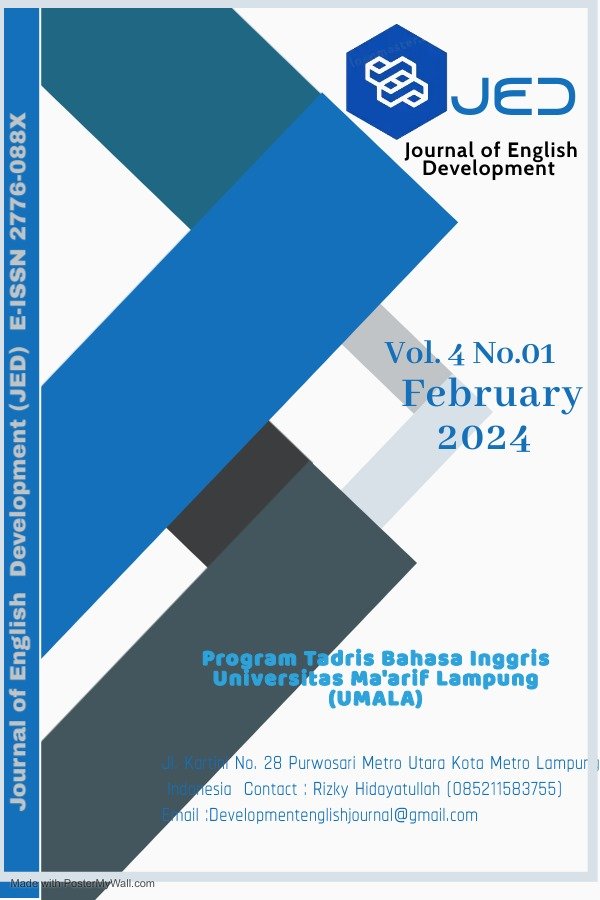The Constructive Implementation of Habit Formation and Learning Motivation to The Students’ Verb Mastery
English
DOI:
https://doi.org/10.25217/jed.v4i01.4302Keywords:
Habit, Motivation, VerbAbstract
Learning English is still an optional subject in Indonesian elementary schools. This is happening in some elementary schools which is determined by each school independently. According to this policy, English is only a subject that complements the management of the curriculum. Another effect is that English learning activities in the classroom result in lessons that place less emphasis on skill acquisition. Of course, this also affects students' lack of ownership of their skills. At the advanced level, students become increasingly confused about English, which was their chosen subject at the previous level. At this level, they encounter increasing difficulties. The study aims to create positive study habits that can be used as a guide for students to acquire desired competencies and as a preparation tool for students to reduce learning difficulties. The goal of learning English is to know the student's vocabulary, especially the range of basic verbs. and how much basic vocabulary do students know of verbs. This is intended to help them understand the context of learning English. It also makes it easier for students to write simple sentences in English. The researcher here uses verb as a variable to limit the study to avoid expanding the analysis. In this way, the extent of the habit formation effect of the verb can be measured. This study used an experimental design and was quantitative in design. 60 junior high school students from Al-Ittifaqiah Indralaya took part in the research study. In replacement of a two-way ANOVA, the data was examined using descriptive statistics, the normality and homogeneity test, the Wilcoxon test, the Mann Whitney U test, and the Kruskal Wallies test. The study's findings demonstrated the effectiveness of habit development in the teaching and learning process and the creation of positive habits.it is notably in mastering the vocabulary (verbs)to the seventh’ grade students of Al -Itiifaqiah Junior high school.
References
Asroni, A. (2023). Students’ Difficulties in Learning English and the Solutions: Case Study of Students of Sunan Kalijaga State Islamic University: English. Journal of English Development, 3(01), 54–64.
Awad, M. (2015). Efficient learning machines: Theories, concepts, and applications for engineers and system designers. Efficient Learning Machines: Theories, Concepts, and Applications for Engineers and System Designers, 1–248. https://doi.org/10.1007/978-1-4302-5990-9
Budiana, K. M., & Djuwari, D. (2018). The non-native students’ motivation in learning English at STIE Perbanas Surabaya. Language Circle Journal of Language and Literature, 12(2), 195–202.
Chadwick, I. C., & Raver, J. L. (2015). Motivating organizations to learn: Goal orientation and its influence on organizational learning. Journal of Management, 41(3), 957–986.
fitrah, M. (2017). Metodologi penelitian : penelitian kualitatif, tindakan kelas & studi kasus. CV Jejak.
Jayanti, N. L. P. (2012). Kontribusi Motivasi Belajar dan Strategi Belajar Bahasa terhadap Kemampuan Berbahasa Inggris Siswa Kelas Dua di SMP Dwijendra Denpasar. Jurnal Pendidikan Dan Pembelajaran Bahasa Indonesia, 1(1).
Kardena, A., Meldia, P., & Putri, E. S. (2022). Causes of Problem during Implementing Learner-Centered Instruction (LCI) Paradigm in EFL Classroom. Journal of English Development, 2(02), 89–98.
Laurillard, D. (2012). Teaching as a design science: Building pedagogical patterns for learning and technology. Teaching as a Design Science: Building Pedagogical Patterns for Learning and Technology, 1–258. https://doi.org/10.4324/9780203125083
McGaghie, W. (2010). A critical review of simulation-based medical education research: 2003-2009. Medical Education, 44(1), 50–63. https://doi.org/10.1111/j.1365-2923.2009.03547.x
Osborne, J. (2003). Attitudes towards science: A review of the literature and its implications. International Journal of Science Education, 25(9), 1049–1079. https://doi.org/10.1080/0950069032000032199
Pituch, K. (2006). The influence of system characteristics on e-learning use. Computers and Education, 47(2), 222–244. https://doi.org/10.1016/j.compedu.2004.10.007
Sugiyono. (2017). Metode Penelitian Kuantitatif, Kualitatif dan R&D. Jakarta: Alfabeta.
Wever, B. De. (2006). Content analysis schemes to analyze transcripts of online asynchronous discussion groups: A review. Computers and Education, 46(1), 6–28. https://doi.org/10.1016/j.compedu.2005.04.005
Yuliastiti, L. P. S., Santosa, M. H., & Myartawan, I. P. N. W. (2023). An Analysis Of 10th Grade High School Students’ Learning Approaches in the Context of EFL Online Learning. Journal of English Development, 3(01), 45–53.

Downloads
Published
How to Cite
Issue
Section
License
Copyright (c) 2024 Muzhir Rinaldi, Mr, Mrs

This work is licensed under a Creative Commons Attribution-ShareAlike 4.0 International License.



